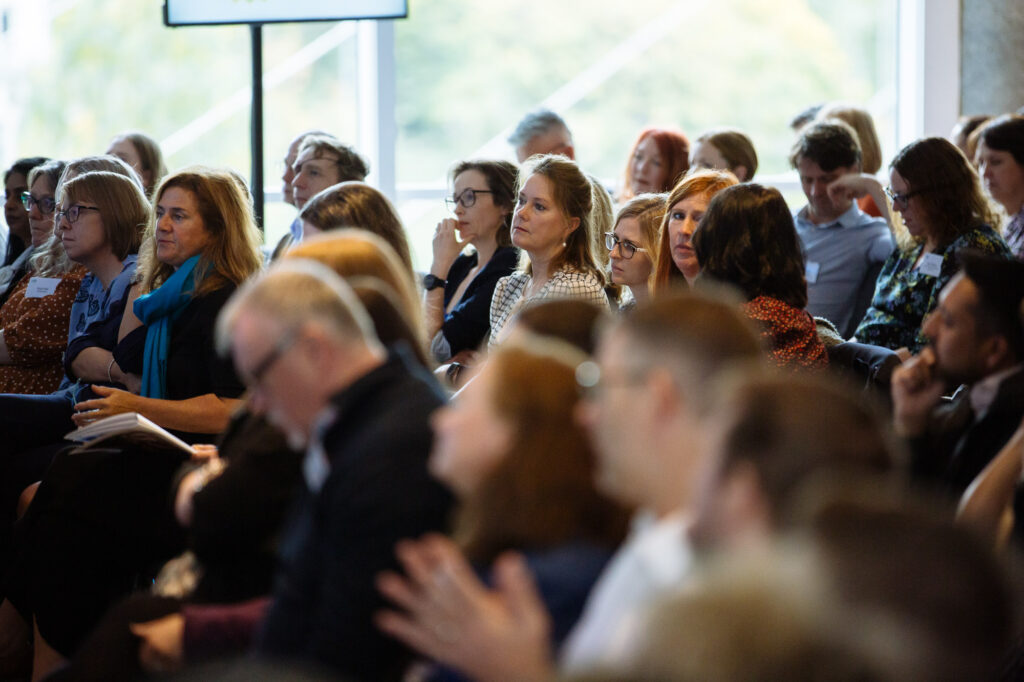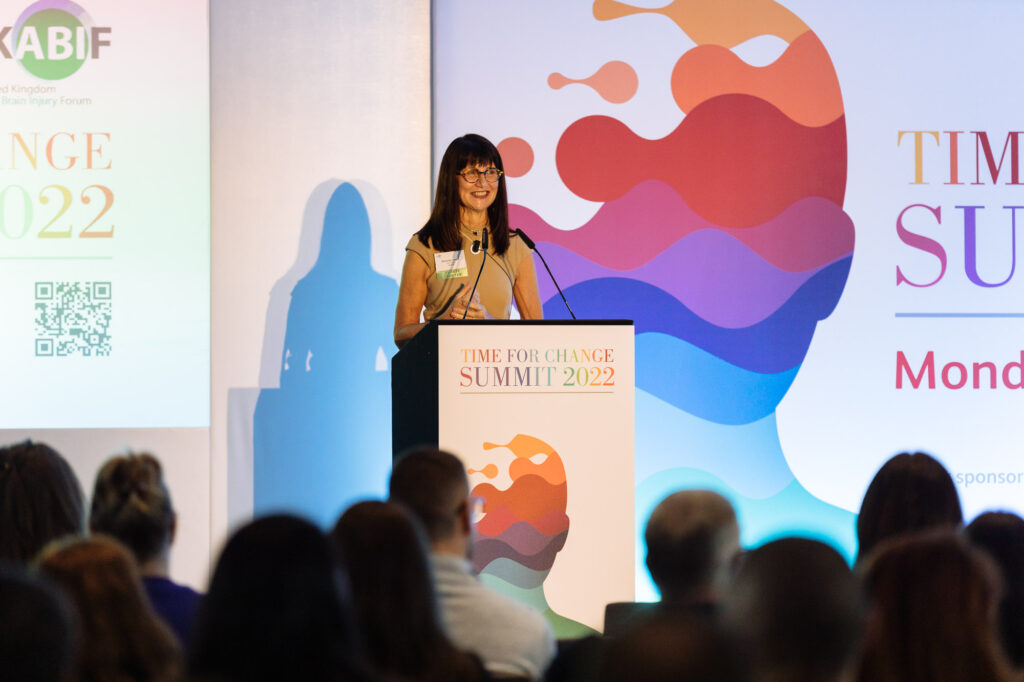The United Kingdom Acquired Brain Injury Forum (UKABIF) Annual Summit headed North in November last year. Delegates were welcomed by Amanda Swain, UKABIF Vice-Chair to the Lowry Hotel, Manchester, UK. Collaboration was a key theme with emphasis on working together to deliver patient-centred care and support for people with Acquired Brain Injury (ABI).
Delegates were eager to hear a progress update on the Government’s cross-departmental ABI strategy, a key recommendation in the All-Party Parliamentary Group on ABI report ‘Acquired Brain Injury and Neurorehabilitation – Time for Change’ published in 2018. Eleanor Parry, Head of Long-Term Conditions and End of Life Care Policy at the Department for Health and Social Care, Lead for the ABI Strategy and Chris Bryant, Member of Parliament and Co-chair of the ABI Strategy Programme Board presented a ‘status report’. The strategy content is being informed by a recent Call for Evidence (CfE) and Eleanor said: “Using the insight gathered we have built a meaningful structure for the strategy.” The strategy development is overseen by a dedicated Programme Board comprising senior officials from relevant government departments to ensure it addresses the wide range of issues that affect the lives of those living with an ABI. Chris commented: “Eleanor is making sure that the Board is getting everything on the page. ABI is a passion of mine and I want a strategy document with deliverable outcomes and a timetable that we can take forward.”

The Community Rehabilitation Best Practice Standards from the Community Rehabilitation Alliance (CRA) were discussed by James Crichton-Smith, Strategic Communications Manager at the Chartered Society of Physiotherapy. Published in October, the 60-page document provides recommendations to guide the development, delivery, and monitoring of high-quality patient-centred rehabilitation. James said: “These standards present a multiprofessional approach to community rehabilitation with an evidence-based solution that shows what good rehabilitation looks like”.
Describing the neurorehabilitation services network development in Great Manchester since 1998 Dr Krystyna Walton, Consultant in Neurorehabilitation, Clinical Director for Neurorehabilitation and Major Trauma Rehabilitation, Northern Care Alliance, and Lead for Greater Manchester Major Trauma Rehabilitation said: “We now provide an effective and efficient neurorehabilitation service that relies on collaboration and delivers for patients, but it’s been a challenging and long journey”. Dr Jenny Thomas, Consultant in Rehabilitation Medicine, Rookwood Hospital, Cardiff, UK agreed that the development of Major Trauma Centres has made a positive difference in discussions about neurorehabilitation services and said: “In Wales neurorehabilitation got a seat at the table in the pandemic and now we’re ensuring it is embedded into services with teams collaborating across the network.”
Significant shortcomings in social work practice, education, and training in the UK were discussed by Dr Mark Holloway, Brain Injury Case Manager and Expert Witness HeadFirst. He presented a review of safeguarding adults with ABI that provides recommendations for social work practice and highlights the need for significant improvements in pre- and post-qualification training and supervision of social workers. Mark said: “ABI knowledge is lacking amongst the statutory services and as a consequence it is not integrated into assessments. Understanding brain injury is crucial otherwise we are failing these people.”

There is also a great deal of work required to improve the management of people with ABI in the Criminal Justice System (CJS), but progress is being made. Dr Stephanie Gibb, Neurodiversity Policy Lead, Ministry of Justice discussed the Neurodiversity Action Plan submitted in June following a call for evidence (CfE) on adult neurodiversity in the CJS. Stephanie said: “We’re making great strides with a whole system approach to making a difference”. She also announced that there will be a Neurodiversity Support Manager in every prison by end of 2025.
As ‘gatekeepers’ the police have an important role in the CJ process and need to identify and support the needs of individuals with an ABI in custody suites. Gemma Buckland, Policy Adviser for the Criminal Justice Acquired Brain Injury Interest Group and Project Manager for UKABIF’s Barrow Cadbury Project and Karene Taylor, Researcher for the Barrow Cadbury Project presented research highlighting the lack of knowledge and understanding of ABI in police custody suites and a lack of screening. This was illustrated by Jordan Ball; an accident on a motorbike left him with a severe brain injury. His father David explained that Jordan is articulate but hides the hidden traumas and complexities of his everyday life. During lockdown Jordan was arrested following driving offences and David said: “The police were accommodating of the brain injury, but the probation service was not understanding at all”.
Dr Czarina Kirk, Consultant Neuropsychiatrist Secure Services at Lancashire Care NHS Foundation Trust, Dr Shahzad Alikhan, Consultant Psychiatrist, St Andrews Hospital and Dr Neel Halder, Clinical Director, Elysium Health Care Group presented their secure services network, commissioned in 2021, that provides brain injury rehabilitation. There are 80 secure beds for adults with ABI but none for women. All three speakers emphasised person-centred care and working together to ‘improve functional behaviour and reduce dysfunctional behaviour.’

Deputyships can be challenging and the importance of getting it right from the start was discussed by Amy Chater, Partner and Professional Deputy, Leigh Day Solicitors and Dr Shabnam Berry-Khan, Clinical Psychologist and Case Manager, PsychWorks Associates, with emphasis on working collaboratively and managing client and family expectations.
Amanda Swain closed the meeting and thanked the speakers, key sponsors Elysium Neurological, Cygnet Health Care, Irwin Mitchell and Leigh Day and exhibitors. She concluded: “We are making great strides in raising awareness of the issues, changing service delivery, and improving overall care. Continue collaborating together and we will make a difference.”
The 2023 UKABIF Summit will take place on Monday 6th November 2023 with a pre-conference dinner on Sunday 5th November. www.UKABIFSummit23.org.uk
For information about UKABIF please visit: ukabif.org.uk